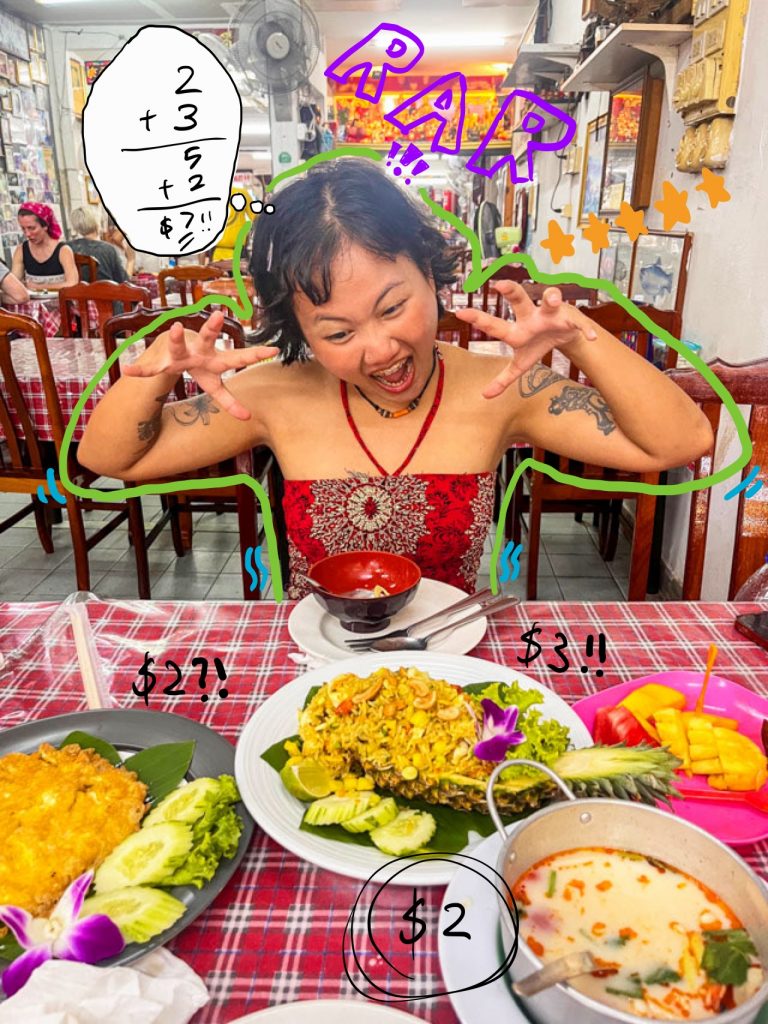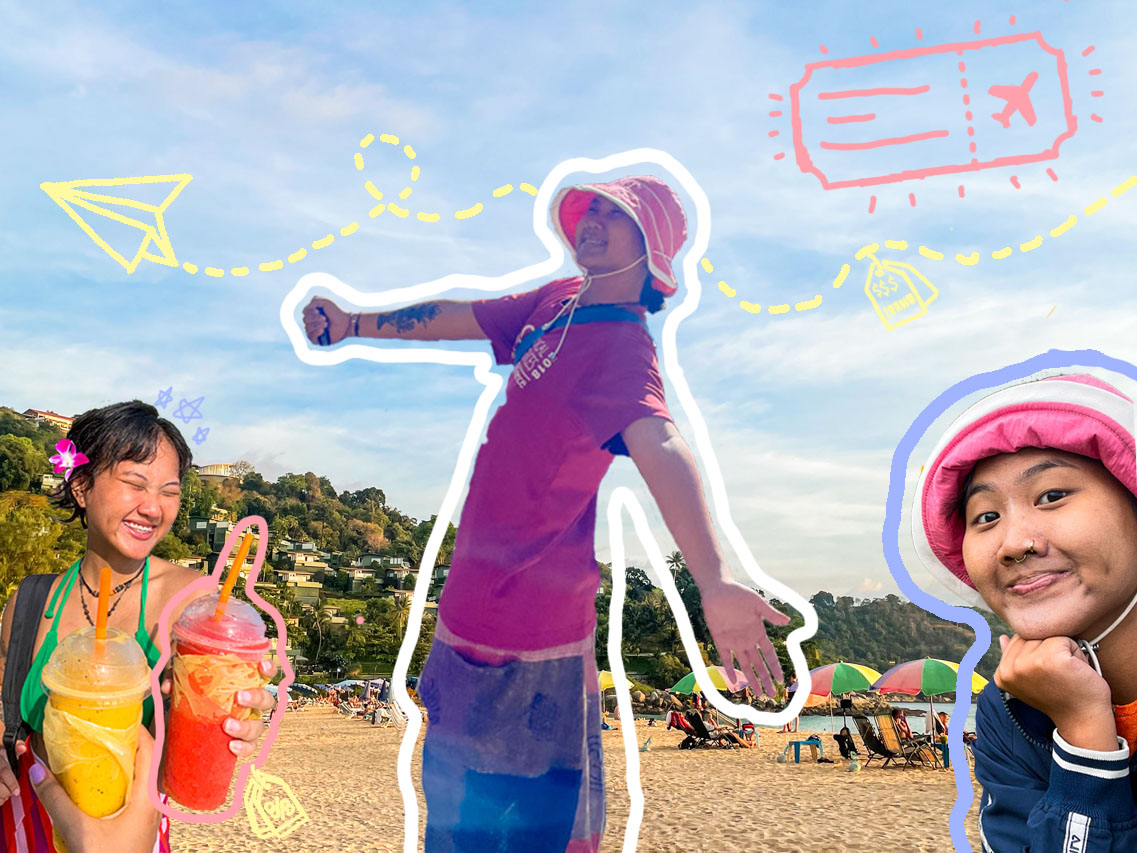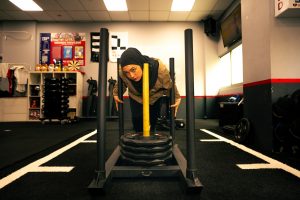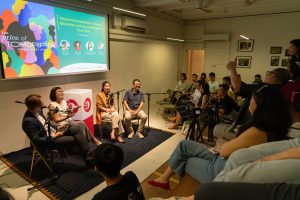Images courtesy of Danya Astria. Illustrations by Nicholas Chang.
“I keep travelling because I don’t have a house. And it’s been really fun.”
Danya Astria is remarkably chipper for someone who’s had to move out of her family home due to conflict. Since 2022, the Singaporean has been living a nomadic lifestyle overseas.
While it might sound like the 22-year-old is living the high life travelling, Danya is far from your run-of-the-mill privileged travel influencer.
In fact, her overseas sojourn was partly because of Singapore’s high cost of living. Travelling overseas—while living modestly, of course—wound up cheaper than renting in Singapore, she says. In the last two years alone, she’s traversed Nepal, Indonesia, Thailand, Sri Lanka, Spain, and Portugal.
Still, she’s cognisant of digital nomad stereotypes: the young, responsibility-free remote worker networking in gentrified beach clubs, enjoying acai bowls three times a day. And Danya wants to be the antithesis of that.
“I like to keep it raw. I think a lot of people, especially in Singapore, kind of glorify luxurious travelling. I like showing the bad things and the good things as well.”
Danya, who calls herself a “homeless backpacker” in her TikTok bio, shares everything from her adventures at barren theme parks to her reviews of cheap, no-frills local food.
While she’s back in Singapore for now to finish her degree, her heart is set on resuming her nomadic lifestyle post-graduation. In fact, as we speak, she’s planning a China trip for the week during her semester break.

Doing the Math
In some ways, Danya is just like her peers. Some 61 percent of Singaporeans polled by Answers.sg aspire to live abroad.
The old Singaporean Dream might have been to chase cars, condominiums, and country club memberships. But more and more Singaporeans are dreaming of moving overseas for better prospects, work-life balance, and a slower pace of life for their families.
Nonetheless, Danya’s path is unconventional. For one, she delayed her graduation by two years and chose to travel instead of stacking internships. For another, she’s living independently in a nation where remaining under your parent’s roof till marriage is still the norm.
She chalks it up to a mix of wanting to escape from the things that were making her miserable in Singapore and search for purpose in her life.
Conflict with her family—including religious differences and abuse—led her to move out on her own in 2021, she shares. While her parents are strict Muslims, Danya sees herself as an agnostic theist.
“I do believe in God and miracles, and I appreciate how God has led me so far in life. But I do not believe in the concept of having one religion or religion in general,” she explains.
Her renouncing of Islam and religion only added to the friction between her and her family. After speaking to a therapist, Danya decided to go low contact with her family.
She found a remote job as a data analyst to fund her independence, but the costs piled up to the point where Danya began to wonder if backpacking overseas might be better than paying out her nose to rent a shoebox in Singapore. And so that’s what she did.

She took a break from her studies at Nanyang Technological University, packed up her life, and bought herself an air ticket to Indonesia.
The fact that Singapore is an expensive city is inescapable. We’re reminded of it with every meal we eat and every bill we pay. Still, it’s mind-boggling that a life of constant travel could be cheaper than staying put here. But it makes sense when Danya breaks down the numbers.
Pre-pandemic, her data analyst salary of about S$3,000 could sustain her, she says. But rents started ballooning post-pandemic. She once viewed a tiny condo utility room with no windows that was going for $760 a month. And if you prefer living in a space with ventilation, a decent HDB common room that isn’t too far-flung will cost you around $1,000, she estimates.
Thanks to the steep rental rates in Singapore, Danya’s usual monthly expenses add up to around $1,400. That’s $1,000 in rent, $300 on groceries and other essentials, and $100 for “fun money”.
On the other hand, living overseas in countries like Sri Lanka or Indonesia is significantly more affordable.
Crucially, Danya says, she lives “very, very cheap”—keeping to a budget of $10 a day. If she’s busy working, a konjac jelly snack could serve as her breakfast. Other times, she sticks to affordable street food. Wherever she spends extra on activities such as paragliding, she makes sure to cut back her spending on other days, she says.
The rest of her expenses are kept conservative as well. Plane tickets are usually $250 or below. To keep costs low, she tries to stay in each country as long as her visa allows. Her biggest expense is an Airbnb or a budget hotel—she needs personal space for work—which is around $400 a month.
That adds up to $950 a month. With her data analyst job paying about $3,000, she’s still able to save up a comfortable amount, she says.
As someone who’s always chasing new experiences, the nomadic lifestyle is ideal for Danya. But she’s aware that it’s not for everyone.
“Every month, I would have to move, and I find it really exciting. But when I told my sister or my friends, they’re like, ‘Oh, I’m so tired just hearing about it. How do you do that?’”
Voyage of Self-Discovery
Travelling to “find yourself” is as tired a cliche as “eat, pray, love” and “get lost to get found”. But there is a reason why travelling is on so many bucket lists.
Danya maintains that the past two years have helped her discover what she wants out of life.
Perhaps it’s a combination of the slower pace of life and simply having the peace and quiet to reflect. Or maybe it’s making connections with locals. Or maybe it’s being forced to survive independently. Daniah tells me she can’t quite put her finger on the reason for the change she’s seen in herself.
One thing that’s obvious, though, is the improvement in her relationship with her family. In this case, absence does really make the heart grow fonder.
“You have to heal away from them first, I found. Don’t speak to them because they might sway you in other ways when they keep contact,” she says, describing the first few years of low contact with her family.
While she travelled, she slowly began to rebuild the relationship at arms’ length. It began with the occasional text. Then, whenever she returned to Singapore, she would visit them.
“The long distance with my family has been good in a sense that it’s more meaningful when I see them. I think they treasure me a lot more too.”
Danya also realised that she was in the wrong major in school.
She’d initially chosen to study biology—a practical choice by any measure. But she slowly realised that business was where her interests were. Throughout her travels, she found the greatest joy in making connections with other people. She knew she wouldn’t be happy stuck in a lab or in academia.

She’s wistful as she recounts living in a Sri Lankan hostel where she got free accommodation in exchange for helping out with their social media content. She even went above and beyond to organise rooftop dance parties and cooking classes. “Because I’m just an extra person,” she quips.
“A lot of people tell me that business is a useless degree,” she laughs. “Well, I think it will give me useful skills.”
As a lone female traveller, though, she’s also had to build up her inner resilience.
Even though she remembers her time in Sri Lanka fondly, her last few days there were marred by a sexual assault incident at a mixed-gender hostel. She didn’t pursue the matter legally as she was about the leave the country. The thought of having to go to court was also distressing, she says.
When I ask other instances of harrassment she has experienced, she replies grimly, “It’s horrible that I can’t remember specific incidents, because it happened so many times.”
She’s had people staring or shouting at her and her female friends. And in some parts of Europe, she’s faced racial abuse.
“Because I’m Asian, I get mistaken for Chinese. Sometimes, they’ll come up to me and yell some Chinese-sounding gibberish.”
Still, her optimism shines through.
“Even with these bad things my mindset is always okay, let’s go to the new place. There are better things out there, we shouldn’t dwell on it.”
BTO’s Not the Way To Go
In Singapore, most of us follow the mainstream path because it makes sense. Financial sense, that is.
You either try your hand at the BTO lottery, or scrimp and save to buy a home as soon as you’re eligible. You’ve then got a nest egg that you can live in till you expire. Or you can climb the property ladder, flipping your home till you eventually attain a coveted private property.
Danya’s not interested in any of that. “I think you can make a lot of mistakes from following what’s planned out for you, because not everything is meant for you.”
Before her previous relationship ended, she had considered applying for a BTO simply because she saw it as a ticket to leave home. Now, she says she’s glad she didn’t do that.
Since June, housing policy changes have made it easier than ever for young adults, including students and full-time National Servicemen, to apply for a BTO flat together. But Danya’s doubtful. Your twenties should be for exploring instead of settling down, she believes.
“It scares me that a lot of people are getting BTOs at my age, and then some are regretting in the future. Or they have to let go of the BTO,” Danya says.
“Money and finances, that’s important, definitely. But other than that, I prioritise travelling more than home stability. And I think a lot of things can come from traveling as well. Like, you can just randomly form a connection and start a business together.”
While home ownership is still the dream for many young Singaporeans, Danya says she’s more keen on exploring the world first.
She does want to have a home base overseas, but she doesn’t know where yet. And at the tender age of 22, who can fault her for not having everything figured out?
She’s animated as she lists several dreams she has, in no particular order.

One of her dreams is to adopt children in the future. Not anytime soon though, she’s quick to add.
And even while she’s happiest overseas, Danya tells me that she does want to give back to Singapore in her own way.
She’s bashful as she admits that she has a dream to save up enough to buy a property in Singapore to set up a halfway house for young adults who aren’t happy at home.
“There really aren’t that many spaces for them,” she tells me. She looks like she’s recalling her own hardships.
Posting about her renting and travel journey on TikTok let her to connect with other young people who also faced abuse and mental trauma, she reflects.
“Back then when I just moved out, I noticed I was being ‘selfish’ in a sense I was too focused on my own growth and self-improvement. I didn’t realise that extending help to my own community would give me a better sense of purpose.”
She tells me that she’s seen youths who think marriage is their only way out of a bad family situation. Or people who are unhappy because they can’t leave home.
Her journey is proof that there are other options out there—and that adventures abroad aren’t just for the rich and privileged.

A New Singapore Dream?
At a time when traditional Singaporean markers of success like cars and home ownership are increasingly out of reach, young people like Danya are coming up with their own.
Taking five years to finish university might sound like a failure by some people’s standards. But because Danya took the time off to focus on personal growth, she isn’t stuck with a degree she isn’t going to use.
But for every Danya who has overcome hardships and found their purpose, there are probably more young people stuck in unfulfilling university courses, working unfulfilling jobs.
We know that our young people yearn for freedom. Some even move out to live independently but end up moving back in with their parents because it’s just so damn expensive.
Perhaps it’s just the natural ebb and flow of things. Just like our ancestors crossed seas in search of a better life, we too are doing the same.
But as a life overseas becomes a fixture of more and more young Singaporeans’ aspirations, maybe we should examine the conditions back home.
What’s it going to take for life in Singapore to be the dream again rather than a place to escape from?






